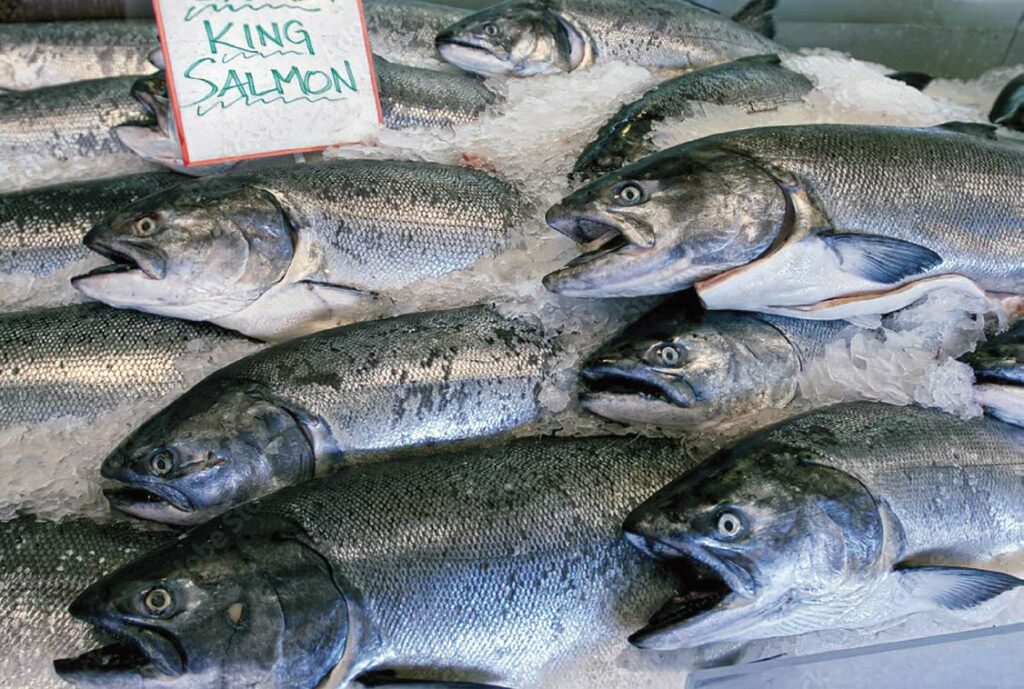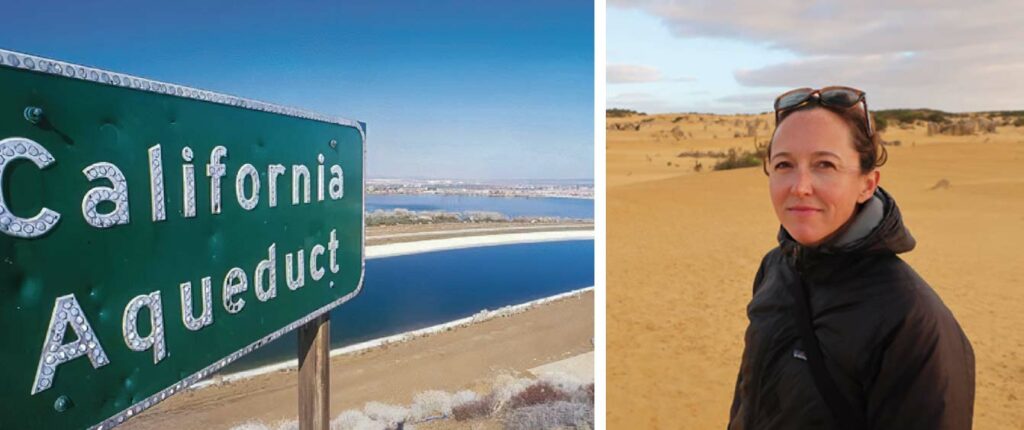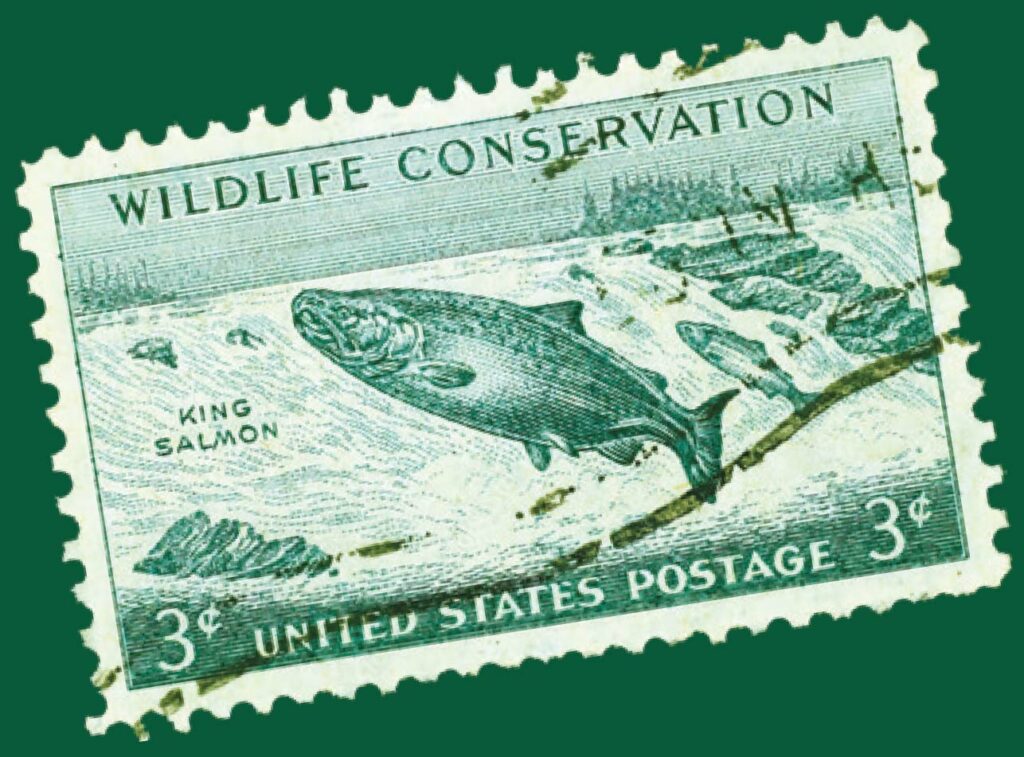
Why there is no local salmon this summer and a health check on the Monterey Bay
PHOTOGRAPHY BY JEFF BAREILLES
When Santa Cruz resident Corey Ridings isn’t surfing or coaching golf at Branciforte Middle School, she’s “gone fishing.”
As a voting member of the Pacific Fishery Management Council (PFMC)—appointed in 2021 by U.S. Commerce Secretary Gina Raimondo and California Gov. Gavin Newsom—and the first member who also works for a major ocean advocacy group, her job is to manage all things fisheries on the West Coast.
Ridings and fellow PFMC members recently made the tough decision to ban commercial and recreational fishing of Chinook (king salmon) for the 2023 season.
“Scientific estimates show very low numbers of fish,” she explains, and the number of king salmon expected to return to California rivers this year is near record lows.
“At the most basic level, California has had so much habitat degradation of our streams, rivers and estuaries that it has become incredibly difficult for salmon to complete their life cycle,” she says. “King salmon require cold and clean freshwater to survive, but water policy and California’s years of drought and warming water temperatures due to climate change have inhibited the salmon from spawning for the past two to three years.”
The water policy Ridings refers to is the 2019 federal act that diverts water from its river ecosystems, that support fish protected by endangered species laws, to the state’s Central Valley farmers.
By law, the U.S. government is supposed to rely on scientific data to strike a balance between the two. But in this case, the Trump Administration ordered California to re-engineer its water plans, overlooking scientific research and biological opinions. California sued to overturn the act and the Trump Administration counter-sued. Ultimately a compromise was reached to divert less water to farmers than initially planned.
Unfortunately, the compromise, combined with years of drought, cut off salmon from the mountain rivers, where they cool off in summer, and from the floodplains, rich with bugs, where they pack on weight in winter and spawn. This has resulted in complete closure of king salmon season in California and most of Oregon.
Coastal communities that rely on king salmon fishing season are experiencing the combined effect of climate change and water policy.
“The ban very much affects the livelihoods of fishing communities. It’s incredibly sad and will be tough for folks,” says Ridings. “But, also note that salmon fisheries are important for some of California’s Tribes who have harvested and depended on salmon since time immemorial.”
“Fishermen from both the commercial and recreational sectors are largely supportive of the ban. They understand that scientific estimates show very low numbers of fish, and they understand the need to protect the species for the future,” she says.
As for Ridings, her bond with fish runs deep. She’s the manager of fish conservation at Ocean Conservancy—the global organization at the forefront of ocean protection. Here Ridings has been measuring the effect of climate change on fish since 2013.
Earlier, Ridings studied marine biology at Occidental College and earned a master’s degree in public health from Yale University. After graduation she was an epidemiologist in Michigan, where she worked with racial and ethnic minority communities to improve disparities in health outcomes and shape state policy. Then she served as a Peace Corps volunteer in the Philippines, developing sustainability projects with local fishing communities.
Presently, she’s pursuing a doctorate in environmental management at the University of Washington, working on fishery and public health issues related to the fishing community and ecosystem sustainability.

Ridings admits that she has a lot on her plate. “All my jobs are related, in terms of topic, interest and passion. They’re all about fish and public health.”
Ridings attributes her dedication to fishing communities to her work in the Peace Corps. “I was inspired by how tightly connected to the ocean the people were and how they protected their fisheries and worked to conserve and ensure that there were fish for their kids to eat.”
Not long after, Ridings was an observer on a North Pacific commercial fishing vessel, counting fish and gathering data. There she saw firsthand how commercial fishermen work, large-scale fish processing and how that part of the food supply chain functions.
Later, she received the Sea Grant Knauss Fellowship to work with the U.S. House Committee on Natural Resources and began to learn more about policy and politics, and how decisions are made at the national level.
“Working in Washington, D.C. got me thinking about conservation, exploring ideas around justice, equity, management and governance,” she says, “and led me to learn about the concept of ‘just sustainability,’ which posits that you can’t have sustainability without social justice.”
This season’s ban on commercial king salmon fishing is a good example of the need to consider the human element or justice sustainability in environmental policy.
The good news of this story is that heavy winter rain and a massive snowpack mean plenty of water for fish in the rivers and for farmers. And Ridings has a good prognosis for the Monterey Bay area, with suggestions of actions to take in our daily routines to ensure ocean health and the sustainability of fish and fishing communities.
- Eat locally caught seafood, as it helps support environmental and social sustainability worldwide.
- Get educated and involved with local decision-making; it will help support a thriving Monterey Bay ecosystem.
- Stay curious. Monterey Bay is ever-changing. Get to know it and its inhabitants, including people, and continue looking for ways to support a healthy ocean ecosystem.
“We’re a very healthy fishing community. Monterey Bay’s natural ecosystem and surrounding communities are doing well,” says Ridings. “Our attention to the Bay is a big part of its health. We like to fish. We like to surf. We like to scuba dive. We like to swim. We like to boat. It’s a central part of the culture here.”

FISHY FACTS
- Creeks flowing into Monterey Bay are the southernmost home to native populations of coho salmon
- The Monterey Bay National Marine Sanctuary is home to more than 500 species of fish and 36 species of marine mammals
About the author
Jeff Bareilles is a Santa Cruz-based hospitality consultant, artist, photographer and writer who has overseen the beverage programs at some of the finest restaurants in California, including Manresa, Atelier Crenn, Commis and Mourad.
- Jeff Bareilleshttps://www.ediblemontereybay.com/author/jeffbareilles/
- Jeff Bareilleshttps://www.ediblemontereybay.com/author/jeffbareilles/
- Jeff Bareilleshttps://www.ediblemontereybay.com/author/jeffbareilles/
- Jeff Bareilleshttps://www.ediblemontereybay.com/author/jeffbareilles/



